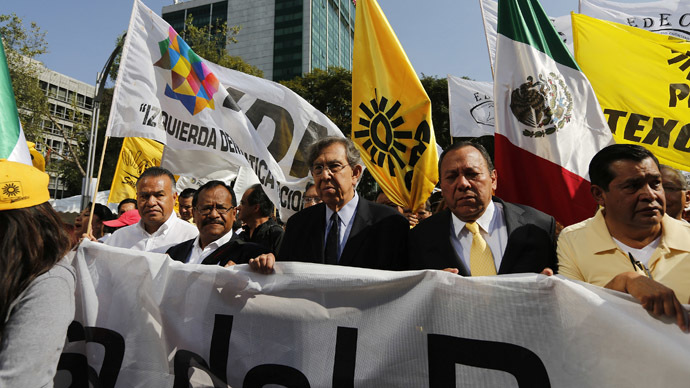Protests fail to stop Mexico’s oil reform, but leftists gain ground

About 75 years ago, iconic Mexican president Lazaro Cardenas nationalized the oil industry in a move that caused shockwaves above the River Grande.
The foreign companies had to go, but not without being compensated with money, cattle, chicken and anything of value there was. That is why state-owned Pemex is so endearing to average Mexicans – they feel they own the company.
Well, not anymore.
Thanks to conservative President Enrique Peña Nieto, known by Mexicans as EPN, the Mexican oil industry is open to internationals again. That didn’t happen without spending some political capital – an asset that leaders usually have in their first year in office. But by his joining rivals PAN, a liberal party that elected his predecessors, Mexicans are confused: do they have a real choice in elections?
Even worse: if Pemex is seen as a harbor for corrupted officials, how could opening it up for foreigners stop the bleeding? How can Mexico become Latin America’s powerhouse again when the president spends more enthusiasm in the energy reform than in an anti-corruption bill? That is the question that made many Mexicans take to the streets in protests, mostly led by left-wing parties.
For the first time since 2006, the leftists have made their mark nationally. They started blockades, marches and even tolerated violent protests to halt “the mother of all reforms” of EPN’s six-year-term. There was so much antagonism that a legislator stripped to his underwear. He and others who did the same argued Peña Nieto was “stripping Mexicans of their rights."
It may look like buffoonery (and it is). But it is no different with the president. He said long ago he had an agenda of structural reforms. His main targets were education, energy and taxation. That came as a surprise to most Mexicans: these are the very reforms his party, the Institutional Revolutionary Party (PRI), refused to take part in during Felipe Calderon’s term.
That move, forging an alliance with rivals, shows how Peña Nieto wants not only some kind of legacy, but also to look as if he were above party divisions. A necessary move, according to his spin doctors: his approval rating at the end of his first year in office is at about 50 percent. Calderon, of the National Action Party (PAN), was at about 60 percent at the same moment and never regained track.
If his reform helps Mexico get a more buoyant oil industry, he will be set to select his successor in 2018. If the new law fails, he will be too mixed up with PAN politicians for people to tell who’s who – but still powerful enough to use his pen and ensure the election of someone to his taste for the presidency. Now it seems down to the left to take the chance and build on what they achieved.
Although the government-sponsored bill passed, the Democratic Revolution Party (PRD) and the Movement for National Regeneration (Morena) are back in the spotlight. In 2006, PRD’s Andres Manuel Lopez Obrador lost the presidency by less than 1 percentage point. It could be a different story when former Mexico City Mayor Marcelo Ebrard runs in the next presidential elections.
That shows the irony of the protests and the new energy bill: they will either re-energize the president, or the opposition.
The statements, views and opinions expressed in this column are solely those of the author and do not necessarily represent those of RT.
The statements, views and opinions expressed in this column are solely those of the author and do not necessarily represent those of RT.













